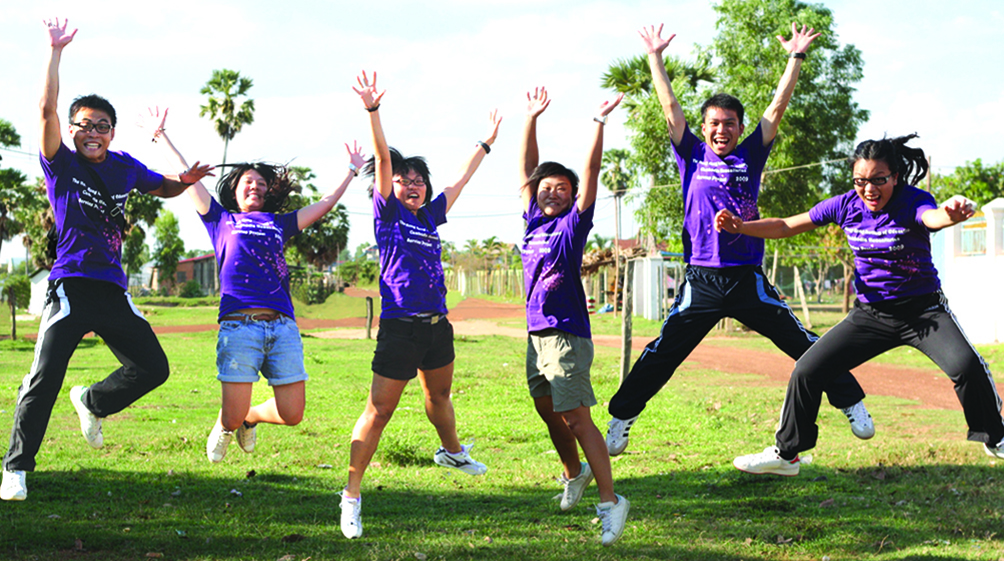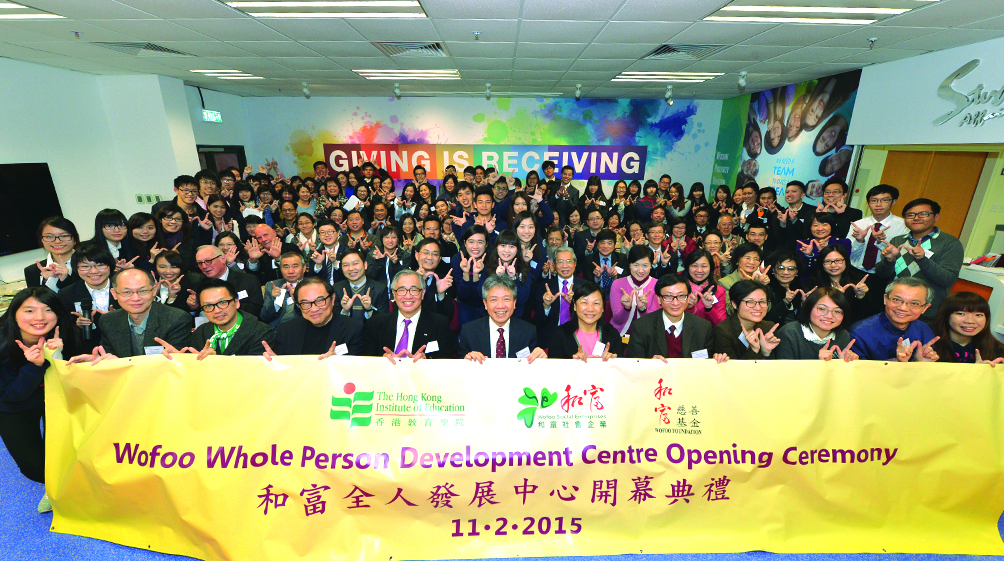

The Education University of Hong Kong1 (EdUHK) is a publicly funded institution, providing a full range of programmes at sub-degree, undergraduate, taught postgraduate and research postgraduate levels. It has inherited a rich legacy from the former Colleges of Education which established a strong foundation for teacher education in Hong Kong. We are the leading provider of school teachers in Hong Kong, nurturing approximately 1,000 professional teachers at pre-primary, primary and secondary levels each year – over 80% of trained kindergarten and primary school teachers and 30% of trained secondary school teachers are our graduates. We are also a pioneer in special needs education. Our graduates have been the recipients of about 75% of the Chief Executive’s Award for Teaching Excellence since its inception in 2003/2004.
With more than 450 academic staff, we have a robust team of experts in education and disciplines complementary to education in Hong Kong. These experts engage in and support teaching, research and knowledge transfer. The latest Quacquarelli Symonds (QS) World University Rankings by Subject (2017) places the University 13th in the world and 2nd in Asia in the area of Education.

Founded upon EdUHK’s programme accreditation status in education, the Education-plus approach was first developed to enhance teacher education by providing students with access to multidisciplinary learning experiences. EdUHK has introduced programmes in disciplines complementary to education, thereby creating synergies between the two categories of programmes. Under the common core curriculum framework, students are required to study at least one elective course from outside their home faculty, and may choose to pursue a second major or minor outside their programme area. With the provision of an extensive array of programmes, the resultant multidisciplinary learning environment enables students to interact academically and professionally across disciplines, thus broadening their horizons and enriching their learning experiences.
Education-plus has been realised primarily across UGC-funded programmes in social sciences, humanities and creative arts and culture [i.e. BA (Creative Arts and Culture), BA (Language Studies), BSocSc (Global and Environmental Studies), and BSocSc (Psychology)]. We have capitalised on the strength of these programmes by providing a multidisciplinary learning environment where teacher education students can take second majors, minors or electives in these newly offered programmes.
New postgraduate programmes have also added to the academic strength of the University. There are examples in each Faculty where specialists have worked across their disciplines to provide distinctive paths of study to different groups of students. Some of these degree tracks have significant educational components, while others are built upon strengths in the complementary disciplines. As an important provider of postgraduate education in Hong Kong and beyond, the University offers Doctor/Master of Philosophy, Doctor/Master of Education and master’s programmes in disciplines complementary to education.
The University’s continuing implementation of the Education-plus approach will ensure:
As one of the top international financial centres, Hong Kong is vulnerable to the challenges posed by competition from emerging economies and globalisation. Perceptions of learner needs are adjusting to the shift from a closed talent economy to an open one with enhanced competition in innovation and technology. Such changes call for greater global awareness and an increased understanding of sustainability issues.
Locally, the rapid development of cultural and creative industries can bring about a more diversified and sustainable type of economic development. Government initiatives are underway to shape Hong Kong as a financial and technology hub. Ageing populations lead to an increasing demand for health and social services. Measures are needed to boost both the quality and quantity of our workforce. There is an unprecedented drive for tertiary institutions to play a key role in promoting innovation and creativity.
All these changes will pose great challenges to the higher education sector in Hong Kong in the coming decade. A response from the University, particularly in the areas of academic development, research and knowledge transfer, is therefore central to future planning. With challenge comes opportunity, and a fitting response from the University to the current pressures for change will ensure that it thrives.
In the 21st century, rapid changes in the global environment, in societal demand and community needs have had far-reaching implications for how education should be delivered. When information is readily available on the internet, teachers need to do more than simply pass on knowledge; they need to also act as facilitators of learning to help students source, select and analyse information. The teachers’ function, therefore, reaches beyond the classroom. Not only should they serve as role models, but they should also facilitate students' whole person development, mentor career paths, contribute to school support teams, and engage with the community.
As the largest provider of teacher education in Hong Kong, the University’s role in leading education and policy discourse is of paramount importance. We are committed to nurturing competent teachers; promoting innovative learning and teaching; strengthening the provision of education leadership training; fostering students’ whole person development; and emphasising excellence in research with an impact on education, social progress and human betterment.
First, we nurture competent teachers by emphasising the core competencies of positive personality, positive work attitudes, cooperation and teamwork, interpersonal skills, and professional knowledge and skills. Strengthened by its incorporation of these elements, our curriculum also promotes the often neglected traditional values of professional ethics, positive education, and Chinese culture. Starting from 2016/17, all full-time undergraduate students will be given the opportunity to take one 3 credit-point course in the Positive and Values Education (PAVE) strand in the undergraduate curriculum. The PAVE courses aim to help students identify and consolidate the positive values infused in EdUHK’s broader course goals and generic outcomes, which are contiguous to education’s broader social aims.

Second, innovative learning and teaching fosters a mindset that is adaptable, open to new learning and equipped with the transferable skills required by the profession. The wide adoption of digital technologies means that students must not only develop skills in the use of digital tools, but also acquire a fundamental understanding of the technology’s underlying principles, and grasp how to maximise their potential in learning, professional development and teaching. ‘Coding education’ for computational thinking development is therefore vital for students to gain this understanding, and may also help them to conceptualise and produce their own Apps for education. To disseminate a deeper knowledge of digital technologies to the community, we provide a learning environment for students to acquire coding knowledge, as well as the computational thinking skills involved in Apps development.
Barriers between and among subject disciplines often stifle creativity. We strive to break down these barriers by encouraging multiple perspectives of appreciation and respect. We also emphasise basic entrepreneurial education by raising students’ awareness of risk-taking and its meaning, e.g., by identifying the risks in starting a business. Likewise, it is important for the young generation to understand that every decision entails an opportunity cost. More generally, we promulgate enterprise concepts and their associated skill sets through establishing partnerships between enterprises and secondary schools.
Third, we will strengthen our provision of education leadership training in schools, particularly at the middle and senior levels. As experienced teachers tend to take up administrative positions, they are expected to act as leaders not only in the classroom, but also in the school. We will provide teachers with the leadership training programmes that meet their diverse needs at different points in their teaching careers.
Fourth, one of the University’s missions is to foster students’ whole person development so that they can become competent professionals as well as active and engaged citizens ready for autonomous lifelong learning. Complementary to the formal curriculum, non-formal learning is an essential component of students’ whole person development. Students are provided with non-formal experiential activities and other local and non-local learning opportunities focused on leadership development, student empowerment, national and global awareness, campus life enrichment, experiential learning enrichment, and global and cultural enrichment activities.

Fifth, the University’s Research and Development philosophy emphasises excellence in research with an impact on education, social progress and human betterment. Research with these objectives in mind directly influences teaching as well as knowledge transfer (KT). Research-led teaching is regarded as fundamental to a university whose core mission is in teacher education, and KT enhances links with the community and practitioners.
University- and Faculty-level research centres attest to the importance of research in achieving the objectives of the Education-plus approach. These centres not only pursue focused research activities in priority areas, but also offer students comparative perspectives and international analyses of major issues related to education and development, family and community, globalisation challenges and policy responses to a range of significant social, educational, cultural and political issues.
The University has adopted an evidence-based approach to assessing good practice in learning and teaching. Our academic staff are asked to report on the use of research and research outputs in their learning and teaching activities. Research informs learning and teaching, including course development and contents. We actively translate our research findings into the enhancement of teaching, teacher education, school management, student learning and policy advocacy. The teaching-research nexus also contributes to the development of postgraduate students, particularly in the area of pedagogy.